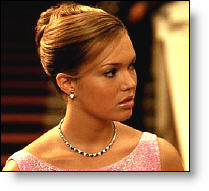Chasing Liberty
 for sexual content and brief nudity.
for sexual content and brief nudity.
Reviewed by: Brett Willis
STAFF WRITER
| Moral Rating: | Very Offensive |
| Moviemaking Quality: |
|
| Primary Audience: | Teens Adults |
| Genre: | Romance Comedy Drama |
| Length: | 1 hr. 51 min. |
| Year of Release: | 2004 |
| USA Release: |






Should I save sex for marriage? Answer
How far is too far? What are the guidelines for dating relationships? Answer
How can I deal with temptations? Answer
What are the consequences of sexual immorality? Answer
What is true love and how do you know when you have found it? Answer

Teens! Have questions? Find answers in our popular TeenQs section. Get answers to your questions about life, dating and much more.
For a follower of Christ, what is LOVE—a feeling, an emotion, or an action?

Learn how to make your love the best it can be. Christian answers to questions about sex, marriage, sexual addictions, and more. Valuable resources for Christian couples, singles and pastors.
| Featuring |
|---|
|
Mandy Moore Matthew Goode Mark Harmon Caroline Goodall Jeremy Piven, Annabella Sciorra Béatrice Rosenblatt Martin Hancock |
| Director |
|
Andy Cadiff |
| Producer |
| Broderick Johnson, Andrew A. Kosove, David Parfitt |
| Distributor |
Here’s another Mandy Moore vehicle film in which she plays an angry, rebellious teen. In her previous outing, How to Deal, her on-screen parents were messed up themselves and her character had good reason to be angry. But here, she’s Anna Foster, the daughter of the President of the United States (Mark Harmon), and her primary beef is that she can’t have a normal life like other kids her age. Rather than point out all the positives of being in that position, the film lets her harp on the negatives and seemingly tries to justify her resentment. Warning: in order to clearly warn viewers about the nature of objectionable content in this film, I was obliged to include more than the usual amount of “spoiler” information.
In a funny, but not-so-funny opening, a young boy, Grant (Stark Sands), drives up to the White House to take Anna out. After putting him through the wringer and wrecking the bouquet of roses that he brought, White House security and the Secret Service let him drive to the front door where he picks Anna up. But no matter where they go, there are Agents all around. When one of Grant’s friends says hi and reaches into his coat for a camera, the Agents jump the entire group. Grant decides he’s had enough, and won’t ask Anna out again. The implication is that it’s like this all the time. Side note: During the opening scenes, Agents refer to Anna as “Liberty” (thus the film’s title); this nickname is never explained, and falls into disuse as the film progresses.
Anna complains bitterly to her dad, and he promises that on one leg of an upcoming diplomatic trip to Europe he’ll let her go out to a dance club with only two Agents assigned to her. She and her friend Gabrielle (Béatrice Rosenblatt), the party-girl daughter of a high official, do go to the club. But when Anna sees that there are many more than two Agents stationed there, she angrily makes a break for it; asks Ben Calder (Matthew Goode), a total stranger, for a ride on his motorbike; and apparently gives the Service the slip.
As it turns out, she hasn’t really escaped; young Ben is Secret Service too. But the President decides to let his daughter have the ILLUSION of freedom, so he issues orders for Ben to continue to pretend that he’s NOT an Agent and to show her a good time, and for the other Agents to keep their distance. So now our romantic couple is off to roam around Europe, with neither of them telling the other who they really are. And while Anna and Ben heat up the screen with a slow-simmering relationship, a pair of Agents tailing them, Weiss and Morales (Jeremy Piven and Annabella Sciorra), find romance with each other as well.
The premise of this film was a risky venture in that Anna’s so-called predicament isn’t something that the audience can readily identify with. But we all wonder at times what life is like “at the top,” so stories about royalty or its American equivalent often do well.
Violence: There’s no violence to speak of. The Agents sometimes react to potential threats. In a crowd scene, Anna is accosted by some young people who recognize her, and Ben must forcibly rescue her.
Language: There are approximately forty profanities, including s* (in English and German), “hell,” “damn,” anatomical and sexual slang, oaths and curses.
Sexual content: One of the first things Anna does after “escaping” with Ben is take off her clothes and go swimming in the Danube (except it’s really not the Danube). There’s lowlight full backside nudity in this scene.
Why are people supposed to wear clothes? Is there a biblical reason? Answer
She, also, gets drunk, making herself vulnerable to Ben whom she’s just met. On another night, when alone with Ben, Anna disrobes (again, backside view only) in an attempt to seduce him. When Pres. Foster sees that Gabrielle has pierced her tongue and remarks that’s he’s going to commission a study on why girls do that, Gabrielle tries to save the government some money by explaining that it makes for better oral sex; but Anna elbows her and shuts her up.
Anna complains to her father that with all this Secret Service protection, she’ll never be able to get to “third base,” then decides to amend her remarks to “second base;” after she leaves the room, the President asks some bystanders to refresh him on what third base is. Anna and Ben end up in the Berlin Love Parade (“love” being a euphemism for “sex”). Weiss and Morales trade sexual banter; they finally fall for each other, and make out while on duty.
It seems there’s no end of contrived situations that writers can dream up in order to justify bad behavior. Ben is in a moral predicament: he’s actually falling for Anna. But aside from any sense of gentlemanly propriety that he may have, his duty as an Agent requires him to keep his distance. When both of them have their money stolen by fellow backpacker Scotty (Martin Hancock), they “have to” tell lies in order to get shelter for the night. They say that they’re newlyweds, and are put into a room together. Although Anna throws herself at him in a desperate attempt to lose her virginity, he refuses her advances and sleeps on the floor.
But later, when they’re hanging out with a bunch of backpackers and Anna is about to give herself to a musclebound hunk that she doesn’t even know, Ben finally relents. His apparent rationale (aside from jealousy) is that if Anna is determined to have illicit sex, it should at least be with someone who cares about her. Keep in mind, at that point both of them are still withholding their true identities.
The most disappointing thing to me is that at the end, the straightlaced Pres. Foster (who has done everything he’s done, including deceiving his daughter, from a desire to protect her) now decides to encourage Anna to continue to see Ben, who is no longer an Agent. This act justifies all her brattiness that resulted in her making Ben’s acquaintance in the first place.
I don’t recommend this film. It’s not explicit in content, but the message of a sexually aggressive teen girl “getting her way” is a horrible one.

The premise itself isn’t too bad, after all, I knew most of that before I went to see the film, but I felt that the film dealt with the content in an unacceptable way, and presented running away as an acceptable solution to discontent in teens lives or to any problems they may face. In fact, one of the girls I saw the film with said to me the next day “My life is worse than [Anna’s]. I want to run away!” Life can be difficult enough for many teens, but movies such as this don’t help by encouraging them to give up and run away, and acting like everything will be just dandy in the end. It’s sad when a nice film premise has to be twisted to the point where it essentially undermines the value of families and facing life.
[Extremely Offensive/3]
[Average/2]
[Better than Average/2½]
[Average/3]
[Very Offensive/1]
[Very Offensive/3]
[Very Offensive/3½]
[Better than Average/4½]
I think that the movie was very good. The chemistry between Matthew Goode and Mandy Moore was amazing. It was exciting, romantic and just an all around good movie!
[Good/4½]
[Average/2½]
[Better than Average/5]
